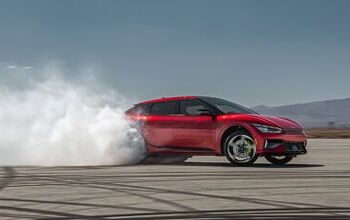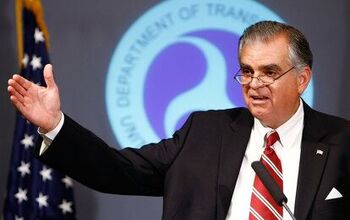The Tragedy Of The Gas Tax
General Motors CEO Dan Akerson set off something of a firestorm a few weeks ago, when he said, in response to a question about forthcoming CAFE increases:
You know what I’d rather have them do — this will make my Republican friends puke — as gas is going to go down here now, we ought to just slap a 50-cent or a dollar tax on a gallon of gas.
Predictably, populists and economic alarmists of all stripes took great umbrage at Akerson’s candor, questioning his leadership of GM as well as his perspective on the shaky US economy. But Akerson is not alone in his support of some form of gas-tax increase. Bob Lutz and Tom Friedman (an odd couple right there, if ever there was one) agree with him. Edmunds CEO Jeremy Anwyl defended Akerson and even suggested a $2/gallon tax earlier this year. Bill Ford and AutoNation’s Mike Jackson are of the same mind as now-retired Republican Senator George Voinovich on the issue. And yet, inside the Beltway, the subject tends to draw a chuckle and a roll of the eyes. Everyone wants it, but nobody wants it.
Since the term “oil addiction” has been used to death, let’s look to an (arguably) less demeaning metaphor: vegetables. Your mother probably didn’t force you to take an honest personal inventory when she made you eat some dreaded brussel sprout or another (which is why the addiction metaphor seems better), but she would have had you not been slave to infantile instinct. So now, with our fully developed faculties, let’s consider what happens if you don’t eat your vegetables.
In the most basic sense, not increasing the gas tax is bad for America’s physical body. Our roads, which circulate the lifeblood of commerce (OK, enough with the metaphor), are literally crumbling. Again, a phrase we may have become desensitized to, but literally true. Car and Driver has a good look at the problem of America’s infrastructure woes and their link to the gas tax, the Highway Trust Fund.
The HTF is a rare beast in the political world. Usually, federal tax money goes into the general fund, where legislators first pass an authorization bill, giving guidelines about how the money can be spent, then a separate appropriations bill actually putting the money into things like buying fighter jets or paying the National Institutes of Health’s electric bill. The HTF’s authorization guarantees that all federal gas-tax revenue will only be put there. Whenever a new transportation spending bill is passed, called a reauthorization, there are slight tweaks to the HTF and how it is spent, but in general it is considered sacrosanct.
Once in the HTF, interstate money is divided according to complex formulas that take into account things such as lane-miles of road, the number of licensed drivers, priority programs for things like bridge replacements, and equity provisions to ensure that every state gets a minimum (currently guaranteed at 92 percent) of their contribution back. State transportation departments, which plan, build, and maintain the interstates, decide what they want to do and then pay for it; the federal share for interstate projects is 90 percent, 80 percent if no high-occupancy lanes are built.
Now, the HTF is running out of money….To match the rate of inflation and have the same value that the 18.4-cent tax did in 1993, the gas tax would have to be increased to 28 cents per gallon.
Safe public roads are a government outlay that all but the most extreme “Atlas Shrugged”-thumpers can get behind, especially in the wake of a rush-hour bridge collapse like the 2007 Minneapolis I-35 bridge collapse. And yet the tax that pays for our interstates hasn’t even kept up with inflation. Increasing the price of gas may hurt Americans’ mobility in the short term, but not having an interstate system is the more dire long-term alternative.
Another downside to undertaxed gasoline, which explains the broad industry support for a gas tax hike, is that America’s cheap gas makes life hell for automotive product planners. Though this might actually be good for TTAC, as it would keep us well-stocked with stories of inventory issues and mis-timed products, we’re not that selfish. Recent history teaches us that the rate of increase or decrease in the price of gas, rather than the price itself, drives the market to the extremes of high and low fuel efficiency (as evidenced by he fact that last month’s hybrid sales fell despite gas prices hitting their 2008 price levels). Industry planners would rather see the price of gasoline taxed to a state to create sustainably steady price increases, eliminating some of the speculative swings in pricing, than to plan for lower efficiency and higher profits only to be caught flat-footed by a price shock. Also, bringing US gas prices into line with the rest of the world will help US market-dependent manufacturers develop truly global products. Finally, a gas tax increase would eliminate the need for the complex, loophole-ridden CAFE regime, which industry lobbyists say “only about six people in the US actually understand.” Lutz explains:
You either continue with inexpensive motor fuels and have to find other ways to incentivize the customer to buy hybrids and electric vehicles, such as the government credits. Or the other alternative is a gradual increase in the federal fuel tax of 25 cents a year, which in my estimation would have the benefit of giving automobile companies a planning base, and giving families that own vehicles a planning base. Every time gas prices go back down, everybody starts buying big stuff again. Gas prices go up a buck, the big stuff is unsellable and everyone wants small cars. Go figure. It’s like the collective memory is about three weeks long. We can’t run a business that way.
And then there’s the issue of “externalities,” or the unborn costs of cheap gasoline. One commonly-cited “hidden cost” of cheap gasoline is the US’s huge overseas military presence. Though the link between America’s military adventures and our low price of gas isn’t always obvious, our intervention in Libya shows how expensive interventions are often undertaken out of fear of a gas price shock. Since the cost of military action isn’t built into the price of gas, this amounts to a hidden cost. Furthermore, the military’s intensive use of gasoline has a multiplying effect on those costs, forcing Pentagon planners to seek ever-greater efficiency simply to maintain existing overseas deployments.
Another there are plenty of other externalities to cheap gasoline. As Akerson points out, CAFE puts the burden of efficiency on auto manufacturers, potentially costing manufacturing jobs, at a time when the oil industry has been immensely profitable. Furthermore, as the video above shows, pollution is another hidden cost of cheap gas. Like military interventions, the cost of health problems caused by pollution is largely born by taxpayers… another “hidden cost” that some estimates place at over a trillion dollars per year.
But the final externality is one that should stop the populist resistance to a gas tax in its tracks: if we don’t pay for our gas with more money, we will do so with our privacy. Going back to the Highway Trust Fund, we find that the only alternative to an increase in the tax itself is the “Vehicle Miles Traveled” tax, a scheme that would require the government to track every single vehicle in the United States and tax it based on the miles traveled. Though in many ways a more fair system than a gas tax alone (as it apportions costs based on use of the infrastructure, without filtering it through the efficiency level of each individual car, the VMT tax scheme is an Orwellian nightmare waiting to happen. Though privacy is not at the height of its popularity at the moment, those who oppose any increase in the gas tax would do well to consider the implications of this alternative (Who does the data belong to? Will law enforcement get access? Will others be able to track you by piggy-backing onto the system?). Especially since no other alternative is even being seriously considered.
Ultimately, the tragic truth is that there may be no way to prevent this final “alternative” to the gas tax for the simple reason that, as efficiency improves towards zero gasoline use vehicles, gas tax revenue will eventually fall away to nothing. But that horizon could be pushed out twenty years if we recognize that not even indexing the gas tax to inflation is unsustainable and if we create a long term “glidepath” of predictably-increasing gas taxes. In this scenario, our highways could be maintained, some of the externalities of gasoline use could be mitigated, and the auto industry would have the predictability to plan products that use the remaining gasoline as efficiently as possible. Moreover, the US would not be taking on any special burden in the global picture, but would simply be joining the rest of the world in paying a more realistic price for our gasoline.
Any one of these arguments could be quibbled with, but at the end of the day, opposition to any increase in the gas tax can only be justified on the fear of short-term consequences that pale in comparison to the longer-term alternatives. Like the auto bailout, sacrificing long-term principles based on short-term fears betrays a lack of faith in America’s ability to innovate its way out of challenges. What’s the principle at stake here? Market function, for one thing, which is fundamentally perverted by willfully hidden externalities. How about the historically unprecedented mobility offered by our interstate system, not to mention the ability to enjoy that mobility without government surveillance? Global equity in an increasingly multipolar world, and environmental justice are other fine principles, if you’re into that kind of thing. Oh, and did we mention America’s swamped fiscal situation that is the backdrop to all of this?
Sadly, the reason a gas tax increase hasn’t happened isn’t because people don’t understand these issues. This isn’t a problem that can be solved by op-eds like this one. Taking on this issue will require a fundamental shift in how the gas tax and gas prices more generally are seen inside the beltway, and based on President Obama’s recent decision to release strategic oil reserves, that leadership is as AWOL as ever. And with an election looming, we’re more likely to see a gas tax holiday (as we did during the last presidential election) than any proposal for an increase in gas taxes. So, what’s the solution? Instead of just verbally supporting a gas tax increase, corporate leaders like Akerson who claim the policy is in their best interests need to stop throwing up their hands at the political challenge and start putting their money where their mouth is. The ideas behind a gas tax increase are so strong, even a moderately well-funded political action committee would at least be able to embarrass a few of the craven politicians who oppose this common-sense policy. You have to start somewhere…
More by Edward Niedermeyer
Latest Car Reviews
Read moreLatest Product Reviews
Read moreRecent Comments
- Doc423 Come try to take it, Pal. Environmental Whacko.
- 28-Cars-Later Mazda despite attractive styling has resale issues - 'Yota is always the answer.
- 28-Cars-Later Try again.
- Doc423 It's a flat turn, not banked, which makes it more difficult to negotiate, especially if you're travelling a little too fast.
- Jeff “So, the majority of our products are either ICE vehicles or intended to utilize those multi-energy platforms that we have. This is a great opportunity for us, compared to our peers, having the multi-energy platforms for all of our products in development and having the agility to move between them,” she said. From what is stated about the next generation Charger it will be released as a 2 door EV and then as a 4 door with the Hurricane turbo straight 6. I assume both the 2 door and 4 door is on the same platform.


















![White House May Propose Gas Tax Holiday [Updated]](https://cdn-fastly.thetruthaboutcars.com/media/2022/07/10/8870350/white-house-may-propose-gas-tax-holiday-updated.jpg?size=350x220)














Comments
Join the conversation
When I was doing this sort of analysis for the industry, I came up with a solution like Lutz'. My recommendation was that we raise the gas tax by a penny a month (can you imagine the congestion if it went up 25c in one day!--heck, maybe have it increase .25c per week). Planning is absolutely necessary for choices to be made with respect to gas use. If you KNOW that your gas will cost more next year then you will plan accordingly. Right now, we are blindfolded and left to wander in the free market where we are hit by external factors that we cannot predict. I don't mind being hit, but at least let me know when and where I will be hit. Frankly, I don't care where the money goes from the tax. Better/safer roads and creating right turn lanes/easing congestion points all seem consistent with cutting gas use. The most important thing is giving owners a clear an irrevocable incentive to make investments into vehicles that use less gas than they otherwise would buy. Outside of fixing low prices, one couldn't come up with a worse system for that than what we have right now.
IF the states made highway maintenance a slightly higher priority than, say, free benefits for voters maybe the roads would be in better shape. Not to many pols get reelected because a few bridges get replaced. Dole out money for community centers, free health care, food stamps, WIC, and a host of other targeted social programs and you too can spend your life in office. Most people don't notice how higher energy costs drives up everything around them. But hey, that's a nice bridge on that toll road, isn't it?